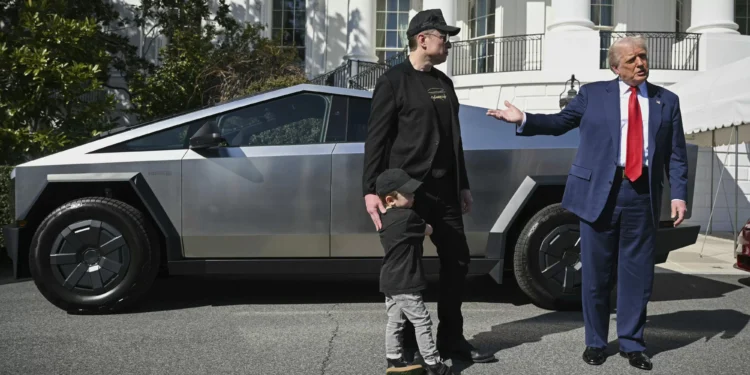In a recent turn of events, President Trump has once again made headlines with his controversial statements. This time, it involves Elon Musk’s car company, Tesla. During a live White House ad, Trump not only showed his support for the company but also issued a warning to those who oppose it. He stated that any protests against Tesla would be considered as domestic terrorism and the protesters would “go through hell”. This statement has sparked a debate on the definition of domestic terrorism and the right to peaceful protest.
It is no secret that Elon Musk’s Tesla has been facing some challenges in recent times. From production delays to financial struggles, the company has been in the spotlight for all the wrong reasons. However, despite these setbacks, Tesla has managed to become a leader in the electric car industry and has gained a loyal following of customers and supporters. This is where President Trump’s support comes into play.
During the live White House ad, Trump praised Tesla for its innovation and contribution to the American economy. He also mentioned that he had personally spoken to Musk and assured him that the government would do everything in its power to support the company. This is a positive step towards boosting Tesla’s morale and encouraging them to continue their efforts in revolutionizing the automotive industry.
However, it was Trump’s statement about protesters that has caused an uproar. By labeling any protest against Tesla as domestic terrorism, Trump has raised concerns about the freedom of speech and the right to peaceful protest. This statement has been met with criticism from various groups and individuals who believe that it is a violation of their constitutional rights.
The question that arises is, if protesting against Tesla is considered domestic terrorism, then what demonstration against Musk isn’t? This statement implies that any form of protest, whether it is against Tesla or Musk personally, will be met with severe consequences. This not only goes against the principles of democracy but also sets a dangerous precedent for the future.
Protesting is a fundamental right of every citizen and has been a crucial tool in bringing about social and political change. It is a peaceful way for people to voice their opinions and hold those in power accountable. By labeling it as domestic terrorism, the government is trying to suppress the voices of the people and discourage them from speaking out against any injustice.
Moreover, this statement also raises questions about the definition of domestic terrorism. According to the FBI, domestic terrorism is defined as “the unlawful use, or threatened use, of violence by a group or individual based and operating entirely within the United States or its territories without foreign direction committed against persons or property to intimidate or coerce a government, the civilian population, or any segment thereof, in furtherance of political or social objectives.” By this definition, it is clear that protesting against Tesla does not fall under the category of domestic terrorism.
In fact, the real threat of domestic terrorism lies in the actions of extremist groups and individuals who use violence to further their political or social agendas. By equating peaceful protests with domestic terrorism, the government is diverting attention from the real issue and creating a false narrative.
In conclusion, President Trump’s statement about protesting against Tesla being considered domestic terrorism is not only alarming but also goes against the principles of democracy. It is important for the government to recognize the difference between peaceful protests and acts of domestic terrorism. The right to peaceful protest is a fundamental right of every citizen and should not be suppressed or labeled as a threat. Instead of threatening protesters, the government should focus on addressing the concerns of the people and finding a solution that benefits all parties involved. Only then can we truly move towards a better and more progressive society.






